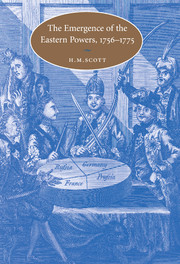Book contents
- Frontmatter
- Contents
- List of maps and genealogical table
- Acknowledgements
- A note on dates and place names
- List of abbreviations
- Introduction: the eighteenth-century European states system and its transformations
- 1 The rise of the eastern powers
- 2 The Seven Years War and the European states system
- 3 The domestic legacies of the Seven Years War
- 4 The stabilisation of Europe, 1763–1766
- 5 Diplomacy and the eastern powers
- 6 From peace to war, 1766–1768
- 7 The partition of Europe, 1768–1772
- 8 The advance of Russia, 1772–1775
- Conclusion: Russia and the emergence of the eastern powers
- Bibliography
- Index
- CAMBRIDGE STUDIES IN EARLY MODERN HISTORY
3 - The domestic legacies of the Seven Years War
Published online by Cambridge University Press: 16 July 2009
- Frontmatter
- Contents
- List of maps and genealogical table
- Acknowledgements
- A note on dates and place names
- List of abbreviations
- Introduction: the eighteenth-century European states system and its transformations
- 1 The rise of the eastern powers
- 2 The Seven Years War and the European states system
- 3 The domestic legacies of the Seven Years War
- 4 The stabilisation of Europe, 1763–1766
- 5 Diplomacy and the eastern powers
- 6 From peace to war, 1766–1768
- 7 The partition of Europe, 1768–1772
- 8 The advance of Russia, 1772–1775
- Conclusion: Russia and the emergence of the eastern powers
- Bibliography
- Index
- CAMBRIDGE STUDIES IN EARLY MODERN HISTORY
Summary
The scale and intensity of the fighting had far eclipsed Europe's most recent conflict, that over the Austrian Succession. Not since the War of the Spanish Succession at the beginning of the eighteenth century had the leading states been involved in such a prolonged and wide-ranging struggle. Its political and financial legacies had strongly influenced international relations during the generation after the Peace of Utrecht. In exactly the same way, the quarter century after 1763 was lived out under the shadows cast by the Seven Years War. The fighting had established new priorities, and these were everywhere pursued during the 1760s and 1770s. The serious domestic problems revealed and also considerably intensified everywhere became the focus of government attention. Peace, retrenchment and reform were the keys to the post-war epoch, objectives which were set by the empty treasuries and enlarged debts. Frederick the Great explicitly declared that this general financial exhaustion was the main reason both for the conclusion of the Peace of Hubertusburg and for the subsequent tranquillity of the international scene. This verdict was not without an element of smugness, as Prussia was the only belligerent with a cash reserve and no substantial debts when the fighting stopped. The King had raised some small domestic loans during the Seven Years War, but always refused to have recourse to foreign borrowing, which would have infringed his principle of autarky.
- Type
- Chapter
- Information
- The Emergence of the Eastern Powers, 1756–1775 , pp. 68 - 102Publisher: Cambridge University PressPrint publication year: 2001

